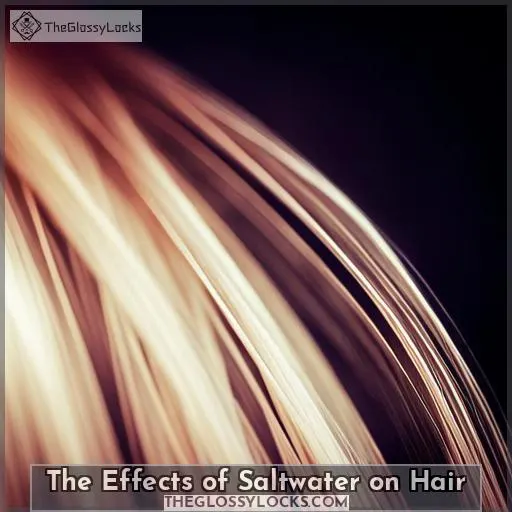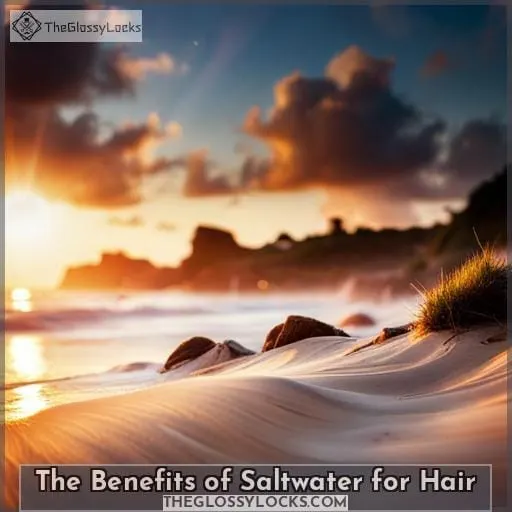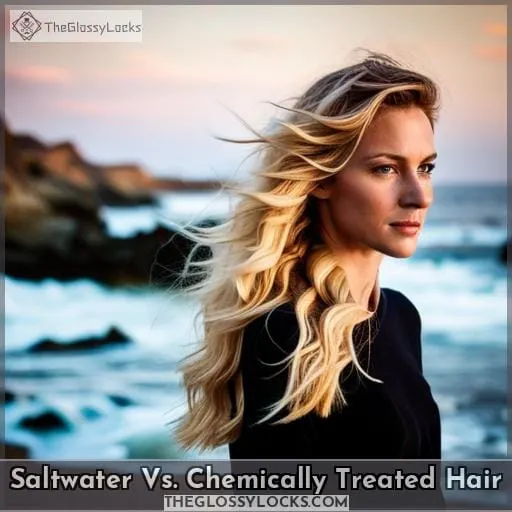This site is supported by our readers. We may earn a commission, at no cost to you, if you purchase through links.
 Imagine stepping out of the ocean, your hair dripping with saltwater. While it may give you that beachy look and added volume, did you know that saltwater can also have some negative effects on your hair?
Imagine stepping out of the ocean, your hair dripping with saltwater. While it may give you that beachy look and added volume, did you know that saltwater can also have some negative effects on your hair?
The high concentration of salt in seawater has a dehydrating effect, leaving your strands feeling dry and brittle.
In this article, we’ll explore the various ways in which saltwater affects your hair, from dehydration to increased body and volume.
Table Of Contents
- Key Takeaways
- The Effects of Saltwater on Hair
- How Does Saltwater Damage Your Hair?
- The Benefits of Saltwater for Hair
- Preventing Saltwater Damage to Your Hair
- Tips for Protecting Your Hair From Saltwater Damage
- How to Get Beachy Waves With Saltwater
- Saltwater Vs. Chemically Treated Hair
- The Importance of Aftercare for Saltwater-Damaged Hair
- Frequently Asked Questions (FAQs)
- Can saltwater help with scalp conditions like dandruff?
- What are some natural alternatives to saltwater for achieving beachy waves?
- Are there any specific hair care products that can help protect hair from saltwater damage?
- Can saltwater damage chemically treated hair more than natural hair?
- What are some recommended aftercare tips for hair that has been damaged by saltwater?
- Conclusion
Key Takeaways
- Saltwater adds volume and body to hair.
- Regular deep conditioning treatments are necessary to counteract saltwater’s dehydrating effects.
- Hydrating oils like argan or coconut help maintain moisture in salt-damaged hair.
- Rinsing hair with fresh water and limiting saltwater exposure is crucial for hair health.
The Effects of Saltwater on Hair
When your hair comes into contact with saltwater, it can have both positive and negative effects.
On one hand, the salt crystals in the water can add volume and body to your hair, giving it a beachy look.
However, on the other hand, the hygroscopic nature of salt can lead to dehydration and brittleness of your strands.
Dehydration and Brittleness Caused by Salt’s Hygroscopic Nature
Saltwater’s hygroscopic nature can lead to dehydration and brittleness in your hair.
- Use a clarifying shampoo to remove salt residue.
- Apply a deep conditioning treatment or hair mask regularly.
- Incorporate hydrating oils like argan or coconut into your routine.
- Limit exposure to saltwater and rinse with fresh water after swimming.
By following these dehydration remedies, you can protect your hair from the damaging effects of saltwater while maintaining its health and vitality.
Increased Body and Volume Due to Salt Crystals
To enhance your understanding of the effects of saltwater on hair, let’s delve into how it can increase body and volume through the interaction with salt crystals.
When you expose your hair to saltwater, the salt crystals adhere to your strands, creating a lifted effect that adds body and texture. This natural process gives your hair a boost in volume and enhances its overall appearance.
So when you’re at the beach or swimming in salty waters, embrace those beachy waves that sea water is known for!
How Does Saltwater Damage Your Hair?
When you expose your hair to saltwater, it can cause damage in a few different ways.
First, the salt in the water has a moisture-wicking effect on your hair, drawing out its natural oils and leaving it dry and brittle.
Additionally, the high salt content can lift your hair cuticles, making them more susceptible to breakage and split ends.
Moisture-wicking and Strand-twisting
When exposed to saltwater, your hair undergoes moisture-wicking and strand-twisting processes that contribute to its damage.
The hygroscopic nature of salt draws out the moisture from your strands, leaving them dry and brittle.
Additionally, the salt crystals lift the cuticles of your hair, making it more prone to losing moisture and causing further dehydration.
To protect against these effects, focus on maintaining moisture balance through proper hydration and post-swim care with nourishing products like leave-in conditioners or protective hairstyles.
Hair-splitting Due to Lifted Cuticles
If you expose your hair to saltwater, the lifted cuticles caused by the salt can lead to hair-splitting and damage.
When the cuticles are raised, moisture is easily lost from the hair shaft, resulting in dryness and brittleness.
To prevent this damage, it’s important to focus on repairing and caring for your cuticles through proper hydration techniques, protective treatments, and using suitable hair care products that restore moisture balance.
The Benefits of Saltwater for Hair
When it comes to the benefits of saltwater for hair, there are a few key advantages worth noting.
First, saltwater acts as a natural exfoliant for the scalp, promoting blood flow and stimulating hair growth.
Additionally, seawater contains essential nutrients that can be absorbed by the hair strands, such as magnesium which has a calming effect on both the scalp and overall well-being of your locks.
Natural Exfoliation and Stimulation of Blood Flow
Experience the natural exfoliation and stimulation of blood flow that saltwater provides for your hair.
Saltwater acts as a gentle exfoliant, removing dead skin cells from the scalp and promoting better circulation. Improved blood flow to the hair follicles can enhance scalp health, leading to healthier hair growth.
Embrace this natural remedy for its dual effects on both your hair’s appearance and overall well-being.
- Exfoliates the scalp, removing buildup and improving skin cell turnover.
- Stimulates blood circulation in the scalp, nourishing hair follicles.
- Promotes healthier hair growth by providing essential nutrients through improved blood flow.
Nutrient Absorption From Seawater
Seawater offers your hair the benefits of nutrient absorption, leaving it nourished and healthier.
The minerals present in seawater, such as magnesium and sulfur, can be absorbed by the hair shafts and scalp. This absorption promotes stronger hair growth while stimulating blood flow to the scalp.
Additionally, marine nutrients like seaweed provide essential vitamins and amino acids that contribute to overall hair health.
Incorporating saltwater into your routine can enhance your locks with natural marine goodness!
Preventing Saltwater Damage to Your Hair
To prevent saltwater damage to your hair, it’s recommended to use:
- Natural hair oils
- Leave-in conditioners
These products can help create a protective barrier and minimize the negative reactions caused by the salt.
Additionally, opting for eco-friendly products can further reduce any potential harm and ensure that you’re taking steps towards maintaining healthy and nourished locks.
Using Natural Hair Oils or Leave-in Conditioners Before Exposure
To prevent saltwater damage to your hair, it’s essential to protect and nourish your strands before exposure by using natural hair oils or leave-in conditioners.
These products act as a preventive hydration barrier, providing nourishment and moisturization to your hair. By applying them prior to swimming, you create a protective layer that helps retain moisture and prevents the harmful effects of saltwater on your locks.
This pre-swim nourishment ensures that your hair stays healthy and protected from salt damage.
Employing Eco-friendly Products to Minimize Negative Reactions
To minimize negative reactions and prevent saltwater damage to your hair, you can employ eco-friendly products.
Making conscious choices towards sustainable alternatives in your hair care routine is essential for the environment.
Look for environmentally friendly products that are labeled as green or natural.
These options often contain natural solutions that nourish and protect your hair without harsh chemicals or synthetic ingredients.
By opting for these eco-conscious choices, you can maintain healthy locks while reducing your impact on the planet.
Tips for Protecting Your Hair From Saltwater Damage
To protect your hair from saltwater damage, it’s recommended to:
- Rinse your hair with fresh water before swimming.
- This helps to saturate the strands and create a barrier against the saltwater.
- Additionally, applying a protective hair mask or leave-in conditioner after swimming can help replenish moisture and nourish the hair, preventing dehydration and brittleness caused by salt exposure.
Rinsing Hair With Fresh Water Before Swimming
Before you go swimming in saltwater, make sure to rinse your hair with fresh water. This simple pre-swim ritual can provide numerous benefits for your hair protection.
Freshwater rinsing helps to hydrate and moisturize the strands, preserving their moisture levels before they come into contact with the dehydrating effects of saltwater. It also acts as a swim prep technique, creating a barrier between your hair and the damaging elements of seawater.
Incorporating this step into your routine can help maintain healthier and more vibrant-looking hair even after swimming in saltwater.
Applying a Protective Hair Mask or Leave-in Conditioner After Swimming
After rinsing your hair with fresh water before swimming, it’s essential to apply a protective hair mask or leave-in conditioner post-swim to safeguard against the damaging effects of saltwater.
These protective methods help enhance hair resilience and maintain its health after exposure to saltwater.
By incorporating nourishing rituals such as applying a deep-conditioning mask or leave-in conditioner, you can replenish moisture and restore hydration levels in your strands, ensuring that they stay strong and vibrant despite the drying effects of saltwater.
How to Get Beachy Waves With Saltwater
To achieve those coveted beachy waves, saltwater can be your secret weapon.
The natural composition of saltwater, with its chloride, sodium, magnesium, sulfate and calcium elements can alter the structure of your hair strands to create texture and volume without the need for heat styling.
By exposing your hair to saltwater and allowing it to dry naturally in the sun or air-drying it after a swim in the ocean, you can effortlessly achieve that tousled look associated with a day at the beach.
The Saltwater’s Effect on Hair Strands
To achieve beachy waves with saltwater, the salt’s effect on your hair strands creates natural texture and volume without the need for heat styling.
Saltwater alters the structure of your hair shafts, resulting in a temporary change in curl patterns and increased body.
The degree to which saltwater affects your hair depends on its porosity.
Hydration techniques such as wetting your hair before swimming or using leave-in conditioners post-swim can help manage the effects of saltwater while maintaining scalp health.
Creating Natural Texture and Volume Without Heat Styling
To achieve natural texture and volume without heat styling, you can use saltwater to create beachy waves. The salt in the water alters the structure of your hair strands, giving them a tousled appearance.
This technique isn’t only convenient but also environmentally friendly since it doesn’t require any electrical tools or excessive product usage.
By embracing this natural remedy for creating beachy waves, you can enhance your hairstyling repertoire while promoting overall hair health and reducing environmental impact.
- Utilizes an all-natural remedy for effortless styling
- Avoids reliance on heat-styling tools that may cause damage
- Promotes healthier hair by minimizing exposure to excessive products
- Reduces environmental impact by eliminating electricity usage
- Enhances mastery of different hairstyling techniques
Saltwater Vs. Chemically Treated Hair
If you have chemically treated hair, it’s important to be aware of the potential increased dryness and damage that saltwater can cause.
Chemically treated hair is already more vulnerable and prone to breakage, so the dehydrating effects of saltwater can further worsen its condition.
To protect your chemically treated hair from these negative effects, it’s crucial to provide extra care and hydration through proper aftercare routines and using specialized products designed for this specific concern.
Increased Dryness and Damage for Chemically Treated Hair
If you have chemically treated hair, saltwater can lead to increased dryness and damage.
Chemical treatments alter the structure of your hair, making it more vulnerable to external factors like saltwater.
Saltwater strips away moisture from the hair shaft, leaving it dry and brittle.
It also weakens the protective barriers of chemically treated hair, leading to further damage and breakage.
To combat these effects, prioritize hydration and moisture retention with deep conditioning treatments and protective styling techniques after exposure to saltwater.
Importance of Extra Care and Hydration for Chemically Treated Hair
For chemically treated hair, it’s crucial to provide extra care and hydration when exposed to saltwater. Saltwater can further dehydrate already processed hair, leading to increased dryness and damage.
To maintain a healthy balance of moisture in chemically treated hair while swimming in saltwater, consider the following:
- Use hydrating products specifically formulated for chemically treated hair.
- Apply leave-in conditioners or deep conditioning treatments before and after exposure.
- Seek professional advice on repair techniques and moisture retention for your specific chemical treatment needs.
By taking these steps, you can help protect your chemically treated hair from the drying effects of saltwater while maintaining its health and vitality.
The Importance of Aftercare for Saltwater-Damaged Hair
To properly care for saltwater-damaged hair, it’s important to use:
- Gentle washing techniques
- Hydrating shampoo and conditioner
These products will help replenish moisture levels in the hair and prevent further dehydration.
Additionally, DIY treatments such as:
- Scalp exfoliation
- Nourishing masks
can provide extra care to restore health and vitality to your saltwater-stressed locks.
Gentle Washing With Hydrating Shampoo and Conditioner
After exposing your hair to saltwater, it’s crucial to gently wash with a hydrating shampoo and conditioner.
This step is essential for maintaining scalp health, replenishing lost moisture, and preventing further damage.
Look for products that contain natural remedies like coconut oil or aloe vera to provide deep hydration and nourishment.
Additionally, incorporating regular use of hair masks can help restore moisture and improve the overall condition of your saltwater-damaged hair.
Remember to follow up with proper styling techniques that minimize heat exposure for optimal results.
DIY Treatments for Scalp Exfoliation and Nourishment
Pamper your scalp and nourish your hair with DIY treatments to exfoliate and replenish after exposure to saltwater.
- Exfoliation Techniques:
- Use a mixture of sea salt or sugar with coconut oil to gently scrub the scalp, removing dead skin cells and promoting circulation.
- DIY Elixirs:
- Create homemade elixirs using ingredients like apple cider vinegar, tea tree oil, or aloe vera gel to soothe the scalp and restore its natural balance.
- Nourishing Masks:
- Apply nourishing masks made from ingredients like avocado, banana, honey, or yogurt to deeply hydrate and repair damaged hair strands.
These simple yet effective at-home remedies will help rejuvenate your hair after exposure to saltwater while providing much-needed moisture and nutrients for healthy locks.
Frequently Asked Questions (FAQs)
Can saltwater help with scalp conditions like dandruff?
Saltwater can potentially help with scalp conditions like dandruff due to its natural antifungal properties. The minerals in saltwater, such as magnesium, may provide relief and promote a healthier scalp environment when used appropriately.
What are some natural alternatives to saltwater for achieving beachy waves?
To achieve beachy waves without saltwater, try using texturizing sprays that mimic the ocean’s touch.
These products add volume and definition to your hair, giving you effortless style and a sense of liberation from traditional styling methods.
Are there any specific hair care products that can help protect hair from saltwater damage?
To protect your hair from saltwater damage, consider using specialized products like Sea Salt Spray.
This product is formulated to shield your hair from the harmful effects of salt water while providing texture and nourishment for that coveted beachy look.
Can saltwater damage chemically treated hair more than natural hair?
Saltwater can indeed damage chemically treated hair more than natural hair. The chemical alterations weaken the strands, making them more vulnerable to the dehydrating effects of saltwater. This can lead to increased brittleness and further deterioration of the hair’s condition.
What are some recommended aftercare tips for hair that has been damaged by saltwater?
To repair saltwater-damaged hair, start by:
- Rinsing with fresh water after exposure.
- Using a hydrating shampoo and conditioner to replenish moisture.
- Applying a nourishing hair mask or leave-in conditioner for added hydration.
- Avoiding excessive washing and heat styling to prevent further damage.
Conclusion
To sum it up, saltwater can have both positive and negative effects on your hair.
While it can give your hair added body and volume, it also has a dehydrating effect, leaving your strands dry and brittle.
However, with proper care and precautions, you can protect your hair from saltwater damage.
By using natural hair oils or leave-in conditioners before exposure, rinsing your hair with fresh water before swimming, and applying protective masks or conditioners afterwards, you can enjoy the beachy waves without sacrificing the health of your hair.











